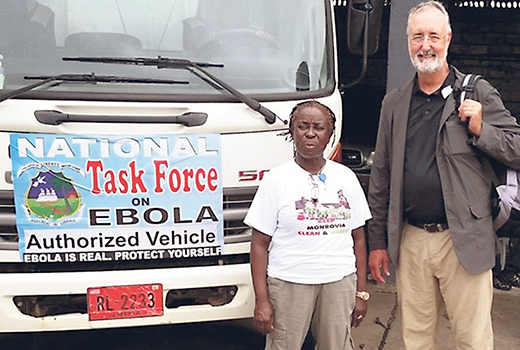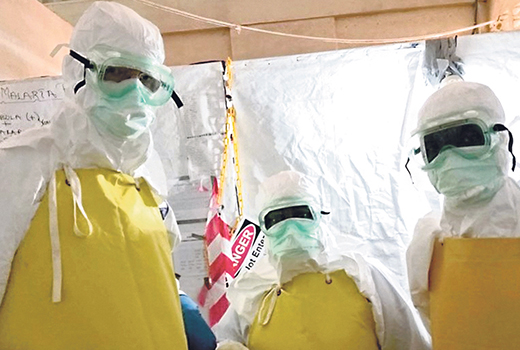Jeff Deal’s disinfecting device has been described as a “superbug slaying machine.” Some have said it looks like the robot R2-D2 from Star Wars.
Deal, who graduated in the 1970s from what was then Anderson College (now Anderson University), took his device to Liberia [recently] to help combat the spread of Ebola.
Deal has been using his machine to disinfect rooms in the Ebola units of two hospitals in the country.
“There is really no other reason I would be here except that Christ expects us to be good stewards of our time and resources,” Deal said in an email from Liberia. “AU helped instill that in me.”
Deal, who lives in Charleston, invented the TRU-D SmartUVC device with his younger brother. The 5-foot-5-inch machine can scan a room, detecting different surfaces, the size of the room and its shape. It then disinfects the room with a certain type of ultraviolet light.
Hundreds of the machines are used in healthcare facilities around the world, but this is the first time it has been used in Africa, said Ali Glemser, a spokeswoman for the company that markets TRU-D.
Deal has had “kind of a weird career path,” said his wife, Hart Deal.
He was born in Toccoa, Ga., and attended college in Anderson on a basketball scholarship. He became a Christian the summer before he went to the school, and the school set the direction for his life, Hart said.
Deal then went on to attend Furman University, also on a basketball scholarship, and the Medical University of South Carolina on a Navy scholarship, Hart said. He has received a certification in tropical medicine from a London college and earned a master’s degree from the University of South Carolina.
Deal has been a doctor for the Marine Corps in Okinawa, Japan, and he worked at naval hospitals in Maryland and Charleston. He and his wife have managed a clinic in South Sudan, Hart said.
He performed microsurgery as an ear, nose and throat doctor until his vision began to deteriorate in 2007, Hart said. Among other jobs, he now works for Water Missions, a nonprofit Christian engineering organization that works to bring clean water and sanitation to developing countries and disaster areas.
He began developing the technology behind his disinfecting device when a speech about contamination at hospitals sparked an idea, Hart said. And two things that scare her are when Deal says, “I’ve been thinking about something,” and when he says, “I have an idea,” she said.
Deal’s four children grew up helping test Deal’s device and they are following in his footsteps, Hart said. The youngest recently graduated from Anderson University.
Deal and his brother built a basic model of the device in Deal’s garage while they were developing it, Hart said. They first tested it in a bathroom on the top floor of Deal’s home.
“It kind of sounds like a science project,” she said.
She never worried about the bacteria in her home, she said, because the device killed them. And that is the mentality Hart maintains while Deal is in Liberia, she said.
At press time, Deal expected to be in Liberia for about another week, but airlines are canceling flights and many of the country’s borders have been closed. He is a little concerned about his health, he said, but the staff in Liberia watch out for him and his device is up and running, he said.
“I have a lovely wife and grandchildren waiting for me,” he wrote in an email. “I have no intention of sitting in isolation for a few weeks.”
— Reprinted with permission from the Anderson Independent-Mail.

